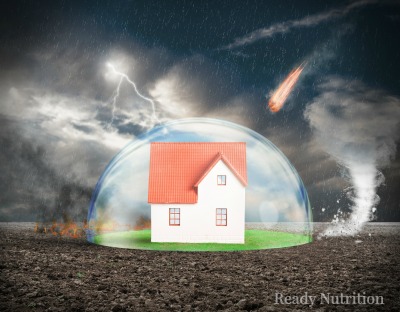
Three days after Hurricane Katrina devastated multiple states around the Gulf of Mexico, there were people who were on the verge of revolting. For three days, they had been wading through contaminated water, searching for food only to find it spoiled and desperately searching to find any kind of safe drinking water. They were also exposed to water-borne diseases, infections caused by injuries sustained during the storm. These conditions, coupled with the irritation of having no help from the government, caused the people to become angry and desperate. They were in a nightmare and were living on the edge. Many of these inconveniences could have been avoided just by preparing for a disaster.
Disasters come in all shapes and sizes. Hurricane, tornadoes, earthquakes, volcanoes, home fires, floods – there are so many, and they happen quite frequently. But, for one reason or another, many do not prepare for any type of disaster that could affect them in the area they live. Despite their reasoning, disasters happen to everyday people all over the world. We may each be faced with a disaster sometime during our lives. Starting to prepare simply involves sitting down and writing a list of survival needs. Once the list is complete, start acquiring items. Those that are prepared for those unforeseen disasters stand a better chance at surviving than those that do not.
Food and Water
Storing a short and long term food supply a little at a time is not a difficult task, nor is it excessively expensive according to many prepping and survival sites. With water being one of the most important items required for survival, having alternative means of getting this invaluable resource would be a good idea. Some alternative sources to use as a backup plan would be rainwater collection barrels, water filters or gravity filters.
Small amounts of food can be purchased each time one steps into a store or whenever they can afford it. There are food storage calculators to help a person obtain the right amounts of food needed to survive for a year, and the numbers can easily be multiplied for further food storage calculations. Taking time to read the nutritional information on the back of the food source will help a person make the best choices for their needs. If a person needs to use their stashed food supply, having foods high in vitamins, nutrients, and proteins will provide their bodies with what it needs for mental clarity, rational thinking as well as maintaining energy levels in order to carry out more intensive, “survivor oriented tasks”.
Skills and Tools
Surviving a disaster will require more than just stored foods and water. Having first-hand knowledge of skills, such as first aid, CPR, basic survival skills, fire safety skills can help ensure safety until help arrives. These skills will create avenues of opportunity that can help a person thrive or help a neighbor or person in need to survive.
Tools are another category of necessities on a preparedness plan. Tools such as generators, flashlights, batteries, utility knives, etc are necessary items to assist in surviving a disaster. For a complete list of suggested tools, click here.
Medical Supplies
Injuries may occur during disasters. Typically, those in need of medical assistance are elderly people that were unable to escape the devastation, the handicapped and those that had no transportation to escape. Having a well-stocked arsenal of medical supplies is essential to anyone preparing for any type of disaster scenario. Therefore, someone should prepare for the worst case scenario. If a person has any medications they take regularly, or prescription glasses, get extra refills of these items and stash them away. If someone has a heart condition or diabetes, prepare accordingly.
Mental Preparation
It is always hard to see the aftermath of a disaster. For those that have not mentally prepared for such possible scenarios to occur, post-traumatic stress disorder and mental illnesses such as depression can occur and the person experiencing these will need to get help. Children especially should be watched closely after a disaster occurs. Having the right frame of mind to handle the stresses before and after a disaster is a key component to surviving the event. Without mental preparedness for a given situation, many succumb to the traumatic event, due to distress, shock, indecision or panic.
Obviously, a disaster is not something to take lightly. With food and water shortages occurring and basic needs not being met, desperation from the unprepared could turn violent. Preparing for any type of disaster puts a person at a greater advantage than most. And, while many are still enjoying the greater things in life, some are using their extra cash streams and using it to the best of their ability for preparing for an unforeseen disaster that may come there way in the near future.
This article was originally published at Ready Nutrition™ on April 29th, 2010






